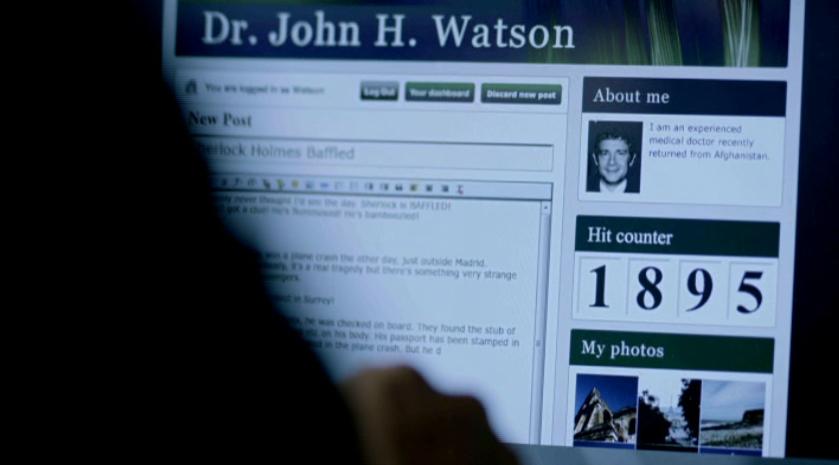Season 2 of the imported Sherlock series begins Sunday on the PBS Masterpiece Mystery series – and once again, this modern-day updating of literature’s most classic sleuth is as clever as its protagonist…
Steven Moffat and Mark Gatiss, who first worked together (just as inventively) on Doctor Who, return with another trio of tales, just as they did when introducing their sly reboot of Sherlock Holmes, Dr. Watson and his intriguing mystery stories.
Benedict Cumberbatch plays Sherlock as an impatient, antisocial super-geek, much more at home with technology than people. He prefers texting to talking, when he can get away with it, and is just as comfortable surveying a crime scene via a portable laptop as visiting in person. And his Watson, played by Martin Freeman from the original British version of The Office, is younger, more fit, and more feisty than the one in Sir Arthur Conan Doyle’s original stories, and in most movie and TV versions.

And this Watson, instead of publishing stories about his exploits with Holmes, writes a blog. How 21st century – especially for characters who first appeared in the 19th, in Conan Doyle’s A Study in Scarlet novel in 1887.
But my, how superbly Holmes and Watson, and these stories, translate to our times.
Holmes sees himself as a bit of a human computer now – a highly functioning brain whose memory banks need not be cluttered with useless information or bothered with social niceties. And the adaptations, rather than avoiding modern technologies and complications, embraces them fully.
The Season 2 premiere, A Scandal in Belgravia, is based on Conan Doyle’s A Scandal in Bohemia, the first of more than 50 short stories featuring Sherlock Holmes to be published by Strand magazine after the success of the author’s first two Holmes novels. Both the original story and the new TV adaptation, shown Sunday night at 9 p.m. ET on PBS (check local listings), feature Holmes investigating a blackmailing beauty named Irene Adler – but most other similarities end there.
In the short story Bohemia, Irene Adler is an American opera singer, in possession of a photograph that documents her illicit liaison with an heir to the Bohemian throne. In the new TV version, Irene Adler, played by Lara Paulver, is a dominatrix whose website’s slogan is “Know when you are beaten.” She, too, has evidence of a politically explosive affair – and when Sherlock and Watson visit her to gather information, she greets them in the nude.

Why? Because it’s an unsettling power move, of course – one that makes Sharon Stone’s leg-crossing in Basic Instinct looks like an Amish slow dance from Witness. But also – and here’s what makes it more great than gratuitous – by stripping down to her bare skin, this Irene is stripping Sherlock, too, of his ability to deduce clues from what a person is wearing.
In the “Sherlock’s eye view” of this mystery woman, instead of producing a superimposed read-out of factual information, the hyper-observant detective gets only a baffling series of question marks. So, naturally, he falls instantly in love – so much as Sherlock Holmes can.
After which, eventually, she steals and replaces his cell phone, but not before swapping out his ring tone for her number with her sexily recorded moan – so that whenever she calls or texts, his phone responds instantly, even if he doesn’t. These are the playful moments, the attention to detail, that make Sherlock so entertaining. Well, that’s one element. Add to that the performances by Cumberbatch and Freeman – both of whom, coincidentally, are starring in the new Hobbit movies – and script adaptations that, no matter how well you know and love the original stories, will have you guessing. And smiling.
Thursday on NPR’s
Fresh Air with Terry Gross, I interview Steven Moffat about the new season of
Sherlock – and, as well, about
Doctor Who. He credits Sherlock Holmes, in a way, as being the inventor of television, a fantastic claim I’ve never heard before, but accept unreservedly. After 5 p.m. ET Thursday, visit the
Fresh Air website
HERE for the full interview.